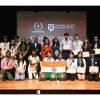No products in the cart.
Kasiga School, Dehradun hosts BSAI Teachers’ Workshop for new teachers
Kasiga School, Dehradun, recently hosted the BSAI Teachers’ Workshop – a three-day residential programme designed as a professional development platform for teachers new to residential schools. The aim of the workshop was to bring together educators from diverse institutions to engage in reflective dialogue, knowledge sharing and collaborative learning. 26 teachers from 11 BSAI Member Schools participated.
The event was graced by distinguished educationists and practitioners who shared their expertise through interactive sessions, discussions, and group reflections. The workshop addressed some of the most relevant aspects of teaching and mentoring in residential schools, such as communication, conflict resolution, child protection, pastoral care and team building.
The workshop formally commenced in the evening of August 1 with participants assembling at Kasiga School campus by 4:30 PM. The inaugural interaction began with an ice-breaking session conducted by Vinay Pande, former headmaster of The Lawrence School, Sanawar. The activity created a warm, informal atmosphere, allowing teachers from different institutions to get acquainted, exchange experiences and feel at ease.
The first formal session, “Life of a Teacher in a Residential School,” was conducted by Dr. Jagpreet Singh, headmaster of The Doon School, Dehradun.
Dr. Singh spoke about the unique responsibilities of teachers in residential settings – where educators serve not only as instructors but also as role models, mentors and caregivers. He highlighted the delicate balance teachers must maintain between academics, discipline and nurturing students’ emotional well-being. His reflections emphasized that teaching in a residential school is a way of life rather than a mere profession, requiring commitment, patience and empathy.
The evening concluded with a community dinner, which further allowed participants to network and share informal conversations.
Day 2 commenced with great enthusiasm and a focus on skill-building. The second session on “Communication and Conflict Management” by Vinay Pande focused on the importance of clear and empathetic communication in maintaining healthy relationships within a school community. Pande shared practical strategies for managing misunderstandings, preventing conflicts from escalating, and building trust through active listening.
Participants discussed real-life scenarios from their own schools, making the session highly interactive and solution-oriented.
The third session on “Educating Staff towards POCSO and NCPCR” was conducted by Garima Rao. As a school counselor, Rao emphasized the legal and ethical responsibilities of teachers under the Protection of Children from Sexual Offences (POCSO) Act and the guidelines of the National Commission for Protection of Child Rights (NCPCR). The session was eye-opening, reminding educators of the crucial role they play in ensuring child safety and fostering a secure environment. Teachers were also made aware of protocols for reporting and responding to sensitive cases.
The fourth session was on “Building Trust and Team Building” by Philip Burrett, former deputy headmaster of The Doon School. He highlighted the importance of trust as the foundation of any school community. Through engaging discussions and activities, he encouraged participants to reflect on how teamwork among teachers directly influences student success. The session underscored that a cohesive faculty team is essential for the effective functioning of residential schools.
This was followed by a session on “Skills for Effective Pastoral Care” by Monisha Datta, director – strategy, planning and training, The Doon Girls’ School, Dehradun
The session was devoted to the well-being of students. Datta explained the concept of pastoral care as a holistic approach – supporting not just academic progress but also the emotional, social and moral development of learners. Participants explored case studies and strategies for being more approachable, empathetic and proactive in addressing students’ needs.
The day ended with a reflective session by Arundhati Shukla, vice-principal (Kasiga School, Dehradun), who introduced the Johari Window framework and its matrix, encouraging teachers to explore the dimensions of self-awareness, openness and interpersonal trust. The session not only deepened participants’ understanding of effective communication and self-reflection but also provided an opportunity for mutual encouragement and the building of a strong understanding of knowing oneself and the peers.
 The final day emphasized reflection and collective learning.
The final day emphasized reflection and collective learning.
“Tutors’ Reflections” by Rashid Sharfuddin, headmaster, Kasiga School, Dehradun
Sharfuddin conducted a session highlighting the pivotal role of tutors in residential schools. He explained how tutors act as guides and mentors, supporting students in both academic pursuits and personal development.
Adding to this, Dr. Vidhukesh Vimal enriched the discussion by sharing his personal experiences in the field of pastoral care. The session encouraged teachers to redefine their roles not just as subject experts but as holistic educators who shape character, values and life skills.
To make the session more experiential, each teacher was assigned one student profile to interact with and reflect upon. This activity allowed participants to step into the role of a tutor, considering how they might address the assigned student’s needs through empathy, structured guidance and effective communication.
Participants’ Reflections
This final session gave every teacher a platform to share their key learnings from the workshop. Each participant spoke for 2–3 minutes, offering their unique takeaways and outlining strategies they hoped to implement in their own schools. The collective reflections reinforced the workshop’s central message: teaching in a residential school is about balancing professional excellence with empathy and care.
The workshop concluded with a farewell lunch, leaving participants motivated, inspired and better equipped to contribute to their respective institutions.
The BSAI Teachers’ Workshop 2025 at Kasiga School was not only a professional development programme but also a celebration of the teaching community in residential schools. During the three days, participants engaged in thought-provoking sessions, practical discussions, and collaborative reflections that deepened their understanding of their roles as educators, mentors, and caregivers.
Also read: Welham Girls’ School hosts 3rd Edition of BSAI Student Leadership Conclave 2025
















Add comment